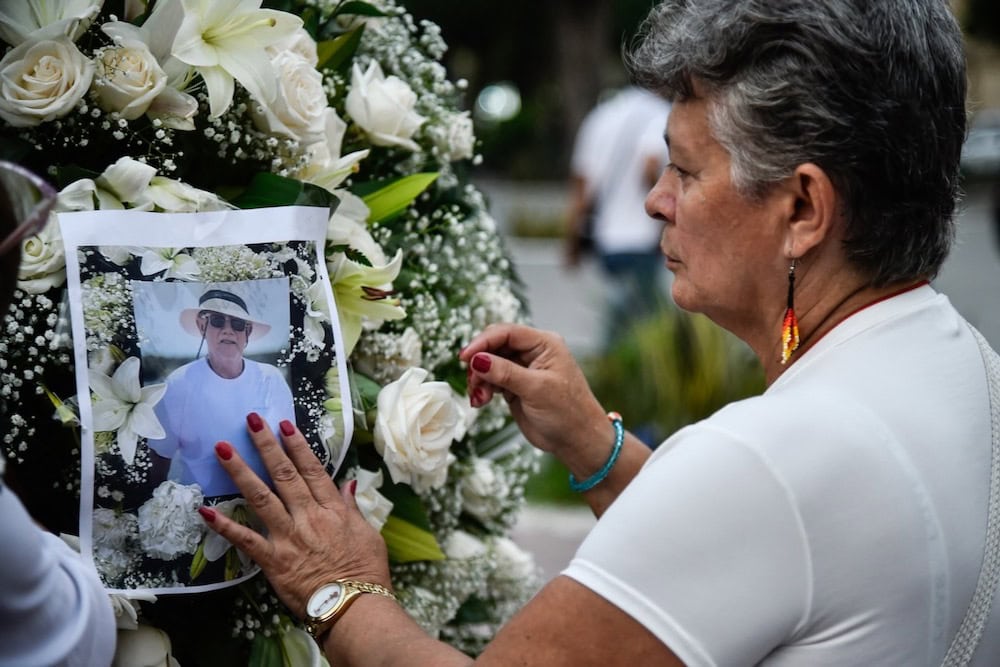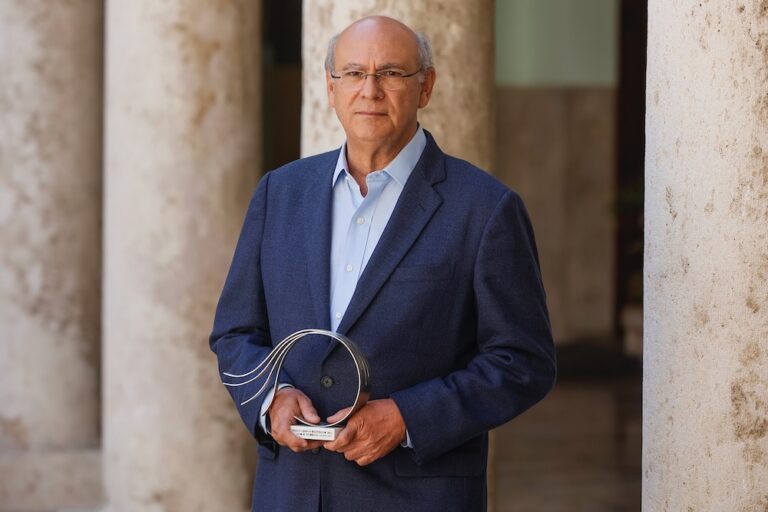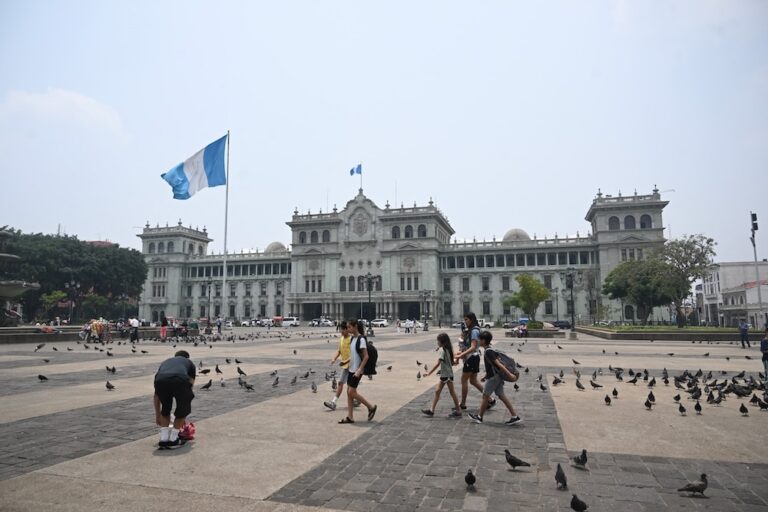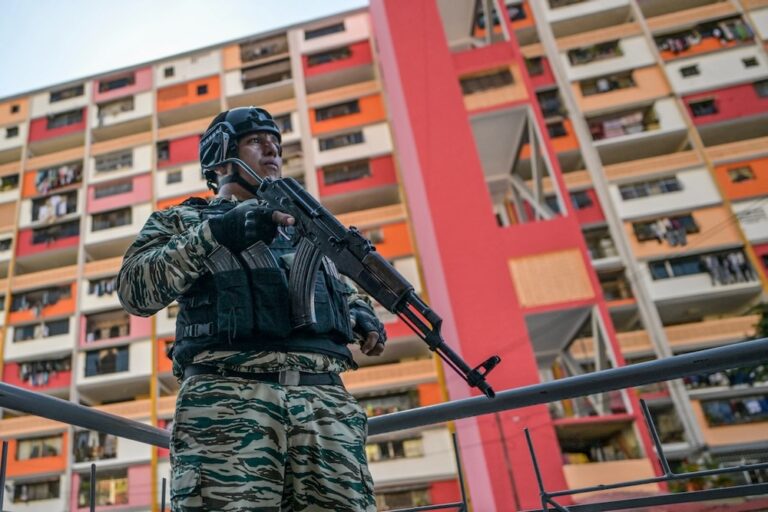April in the Americas: A free expression and civic space round-up produced by IFEX's Regional Editor Laura Vidal, based on IFEX member reports and news from the region.
In Venezuela, a proposed law against fascism threatens to suppress dissent by penalising past political protests and limiting media freedom, posing severe implications for civil liberties. In Colombia, the murder of a journalist underscores a rising trend of violence that inhibits press freedom, as journalists face increased threats and a lack of adequate protection. In Central America, authoritarian shifts threaten journalistic and civic freedoms, with governments employing repressive laws under the guise of security, challenging democratic norms and human rights.
“Sowing peace”? Or another move to close Venezuelan civic space
On 25 March 2024, Vice President Delcy Rodríguez announced the creation of the High State Commission Against Fascism and Neo-Fascism. This commission is tasked with drafting legislation aimed at curbing “fascist and neo-fascist” influences in Venezuela’s political sphere. The law also aims to target individuals involved in the 2014, 2015, and 2017 protests, members of the opposition-majority 2015 National Assembly (which was later stripped of its powers by the government, who later created a new Constituent Assembly) and actors linked to US government interests, citing these groups as harbouring neo-fascist tendencies.
Rodríguez’s statement emphasised the urgency of this legislation, framing it as a global imperative to combat fascism in all its forms, including economic manifestations like sanctions imposed by foreign powers. The proposed law outlines severe penalties, including imprisonment and substantial fines for those deemed to be promoting “fascist ideologies”.
Local human rights organisations such as Laboratorio de Paz have criticised the proposal, arguing that there is no significant ultra right movement in Venezuela that would warrant such a law. They also contend that the law could be used to retroactively criminalise political dissent and suppress civil liberties.
IFEX member IPYS Venezuela has also raised concerns about the implications for media freedom, noting that the law would require media outlets to censor any content deemed fascist, potentially stifling criticism of the government. Espacio Público, also an IFEX member, has echoed these concerns, warning that the law’s broad and vague definitions could lead to disproportionate penalties and an increase in human rights violations. The organisation also highlighted the opacity of the whole process and how the bill failed to meet the minimum requirements of the Internal Regulations and Debates of the National Assembly, as its approval in the first discussion was configured without a debate, let alone the participation of civil society representatives.
This new legislative move curtailing freedom of expression and civic space should not be seen as separate from the controversial “International Cooperation Law”, known as the NGO bill, spearheaded by Diosdado Cabello, which threatens to further constrict civic space. This legislation mandates NGOs and civil associations to re-register under a stringent new system that scrutinises their members, donors, and financial activities, potentially tightening the government’s grip on civil society.
Organisations have also linked this new strategy with the “Law Against Hatred, for Peaceful Coexistence and Tolerance” that was approved by the Constituent National Assembly in 2017. According to Espacio Público, this legislation lacks the formal and substantive requirements to be considered a law, and its content violates principles regarding freedom of expression by reinforcing the official line to censor any critical or independent expression under the pretext of “sowing peace”. The terms and criminal figures stated in this legal framework, such as “hatred,” are so broad and vague that any expression could be construed within this category, which grants wide discretion in interpreting the norm.
Eduardo Trujillo, a human rights expert and research professor at Andrés Bello Catholic University’s centre, told Voice of America that the law addresses aspects “already covered in the Constitution” of the country. He noted that the text not only “strays a bit from the actual historical content” of fascism but that it will “deter political participation” and could have an effect on the pre-electoral process currently underway in Venezuela.
Lethal censorship in Colombia: Escalating violence against the press
The assassination of journalist Jaime Vásquez on 14 April 2024, in Cúcuta, Norte de Santander, marks a disturbing increase in violence against journalists in Colombia. Vásquez was known for his investigative reporting on corruption and public malpractice, often using his platform to expose irregularities in local governance. His murder highlights the extreme risks faced by journalists in regions plagued by violence and political instability.
The Fundación para la Libertad de Prensa (FLIP) has documented a significant rise in attacks against journalists in Colombia, particularly in Cúcuta, where Vásquez was killed. These attacks include threats, harassment, and physical violence, creating an atmosphere of fear that deters journalists from pursuing sensitive investigations. FLIP has criticised the lack of effective protective measures for journalists, especially those like Vásquez who had previously been identified as at risk and was under the security protocols of the National Unity of Protection. The Unity had given Vásquez a bodyguard, but he was nonetheless unaccompanied at the time of the attack.
In response to the murder, FLIP has called on local authorities to strengthen their strategies for journalist protection and to address the impunity that often surrounds crimes against the press. Vásquez’s killing is far from the only incident affecting the press in April. Over 13 journalists were attacked during anti-government protests across the country, and journalist Juan Alejandro Loaiza was declared missing. Loaiza, the director of the radio station La Despensa in Algeciras, Huila, had been under protective measures granted by the Inter-American Commission on Human Rights (CIDH) for the past three months. Since 2022, Loaiza has faced multiple threats, leading the National Protection Unit to assign him a protection scheme. FLIP reports:
“Given the escalation of aggression and the lack of guarantees and responses from the authorities, local journalists say they will only report on what happens in the department but will not provide critical coverage of news related to acts of corruption.”
This adds to a complex situation of risk faced by journalists in the Huila department, who since May 2023 have been harassed, threatened, and declared military targets by the Central General Staff (EMC), a dissident group of the FARC-EP.
Central America: Normalising the exception
IFEX’s member ARTICLE 19 Mexico and Central America’s 2023 report sheds light on the authoritarian tendencies pervading Guatemala, Honduras, and El Salvador, highlighting a regional trend toward the erosion of press and civic freedoms. The report criticises these governments for their repressive measures, which include using emergency laws and security decrees to curb journalistic activities and suppress dissent.
The report points out that in Nicaragua and Cuba the situation is extreme, with journalists, activists, and dissidents facing imprisonment or forced exile for opposing government narratives. This suppression of dissent is part of a broader effort to normalise authoritarian control over public discourse and limit the availability of information.
We must not lose sight of the remarkable actions of journalists, human rights defenders, and community communicators who, despite facing significant risks and high costs, continue to inform and engage the public. Their dedication, amidst an undeniable shift towards authoritarian rule, and regardless of political leanings, is particularly noted in Guatemala, whose exceptionally complex presidential elections this year have shown how far traditional parties are prepared to go to stay in power.
Meanwhile, in Honduras and El Salvador, attempts to forge a society free from the violence of corruption and organised crime paradoxically coincide with a contraction of civic space. This trend can also be seen in Nicaragua, where the total closing of the civic space consolidates the system as a fully fleshed dictatorship.
In its analysis, ARTICLE 19 Mexico and Central America calls for international attention to these abuses and for support for those working on the ground to uphold human rights and democratic principles:
“It is not normal that in Nicaragua and Cuba journalists, dissidents, and activists find themselves in prison, forced into silence or exile for expressing criticism or spreading information contrary to the official narrative. None of this is normal, but the systematic attacks against press freedom want us to normalise it.”
In Brief
Tensions between X’s Elon Musk and Brazil: A Brazilian Supreme Court judge has opened an inquiry into Elon Musk after his refusal to deactivate certain accounts on X, escalating tensions over digital rights.
Violence against journalists in Mexico takes another victim with the killing of Roberto Carlos Figueroa on 26 April. Days before, RSF had issued a statement pointing out that Mexico has made no progress on protecting journalists during AMLO’s six years as president.
Civic space in the United States narrows: The Supreme Court’s decision not to hear Mckesson v. Doe effectively abolished the right to organise mass protests in the states of Louisiana, Mississippi, and Texas.
Meanwhile, the US government moved forward to possibly becoming the first country to ban TikTok over privacy concerns. IFEX member EFF has expressed concern in the past over the drastic move, which it says is without sufficient justification; and its director, David Greene, told Mashable that the government “will be hard-pressed to show that the law satisfies the appropriate First Amendment scrutiny”.
Also in the US, protests against Israel’s war in Gaza on university campuses around the country are being met with arrests and threat of suspension. The situation is still evolving at the time of writing this brief. At Columbia university, seen by many as the heart of this series of protests, a number of negotiations aimed at persuading students to leave encampments took place. However, on 29 April authorities issued communications noting that negotiations had come to a standstill.
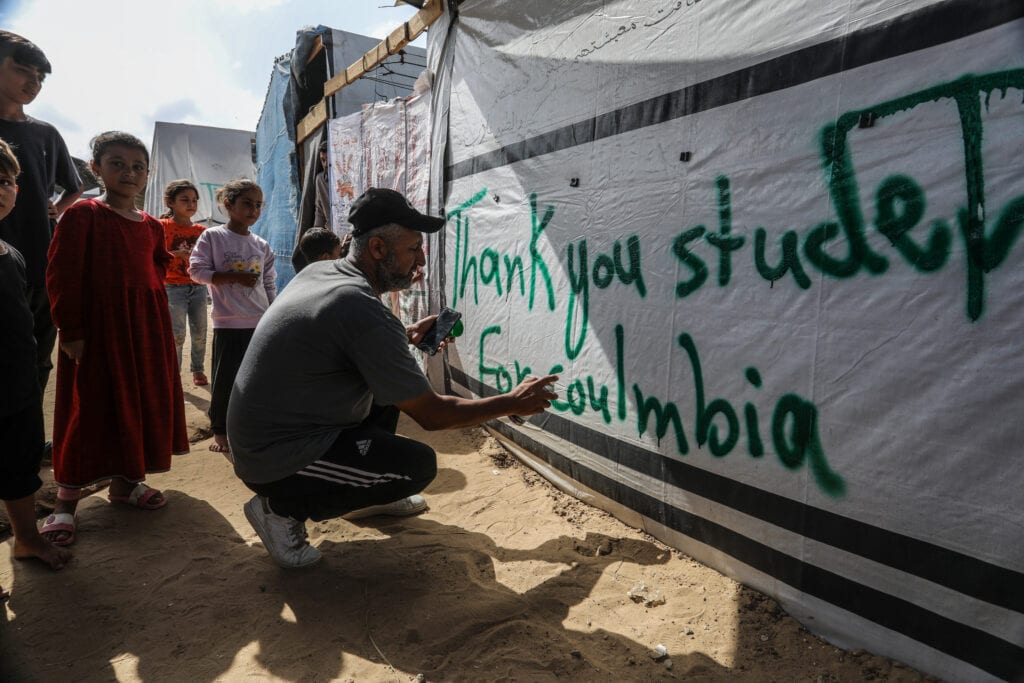
Palestinians thank American students for their support for Gaza by writing on the tents they live in, in Rafah, Gaza, 28 April 2024. (Abed Rahim Khatib/Anadolu via Getty Images)
